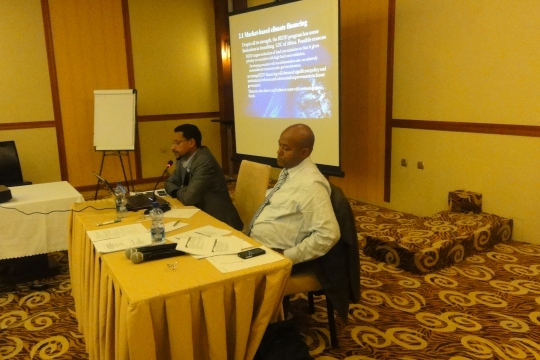Press release from Environmental Economics Policy Forum for Ethiopia, Addis Ababa, Ethiopia 2011-07-20
Africa has benefited too little from climate finances as compared to other continents with emerging economies. Climate projects are distributed unevenly across regions as well as among developing countries. This has something to do with lack of skilled manpower, and restrictive criteria of most of the climate fund projects and programs. The Cancun meeting has availed ten percent of the ‘fast-start’ finances for agricultural adaptation projects in most climate vulnerable countries. Economists Dr. Assefa Seyoum, Dr. Adane Tuffa, Dr. Alemu Mekonnen and Dr. Zenebe Gebreegziabher, try to assess and document climate finances for adaptation, mitigation, capacity building, and technology development and transfer focusing on those issues that are at stake for Africa in general and Ethiopia in particular.
Left Dr. Assefa Seyoum from Addis Ababa University, presenting paper; right Dr. Alemu Mekonnen, Coordinator of EfD Ethiopia
Climate finance is one of the mechanisms designed to combat the effects of climate change in developing countries. The distribution of climate funding across nations need to be based on a set of national climate need factors such as need for adaptation and mitigation, carbon sinks, and clean development infrastructures. Regardless Africa in general and Ethiopia in particular have not benefited from climate finances as should have been. Despite all the efforts only 15 out of 500 CDM projects that have been accepted by the UNFCCC are being implemented in Africa and in most cases not in Sub-Saharan Africa. For instance, in Ethiopia there is only one Clean Development Mechanism (CDM) project that reached implementation stage so far.
The fast-start climate fund, Green Fund and REDD (Reduced Emissions from Deforestation and Forest Degradation) are also other climate finance avenues for Africa besides the CDM and other carbon markets.
Promised funding, including the fast-track ones, took much longer timeframe to arrive in developing countries. In Ethiopia in particular and African in general should go for grants for the development phase as well as for the first two years of implementation of REDD projects.
The complex procedures are not the only reasons that hinder the efficient utilization of the climate finances. Right adaptation strategies of the recipient countries are equally important. The national plan and development strategies of the countries should also take into account the issues of climate change and REDD. Climate change derives crop failure that aggravates food insecurity and poverty as agriculture is most vulnerable to climate changes. In African countries in general and for Ethiopia in particular the integration of climate finances such as REDD to agricultural sector make agriculture climate-smart. Moreover, given the high risky venture it becomes difficult to involve private sectors in providing insurance coverage for climate related damages. Some share of the climate finance should be used for ‘climate change induced loss insurance’ as part of the mitigation and adaptation process.
In general, there is a need to harness climate finances and institutional set up to enhance flexibility, effectiveness and equity of the benefits distribution spatially and across the climate finance chain in Africa. Furthermore, the climate finance criteria should state clearly the accountability and participation of local communities in decision making for sustainable climate protection and realization of co-benefits in Africa.
The research received funding from Sida (the Swedish International Development Cooperation
Agency) and the African Capacity Building Foundation (ACBF) through the Ethiopian
Development Research Institute (EDRI).
Time and place for public presentation: 09:00 am on Wednesday 20 July 2011 in Jupiter International Hotel, Cazanchis area, Addis Ababa, Ethiopia.
Title of the research:
Harnessing Climate Finances for Climate Protection and Sustainable Development in Africa
More information Contact: Assefa Seyoum, telephone +251(0) 911310750, email aseyoumw@yahoo.com
Co-authors:
Adane Tuffa, telephone +251 (0) 913178226 , email adtufdeb@hotmail.com
Alemu Mekonnen, telephone+251 (0) 11 553 86 32, email alemu_m2004@yahoo.com Zenebe GebreEgziabher, telephone +251 (0) 11 553 86 32, email zenebeg2002@yahoo.com
Press officer: Tsehay A. Hailemichael, telephone +251 (0) 11 553 86 32, email tsehayata@gmail.com
